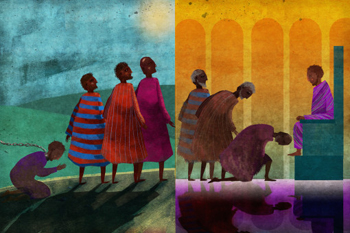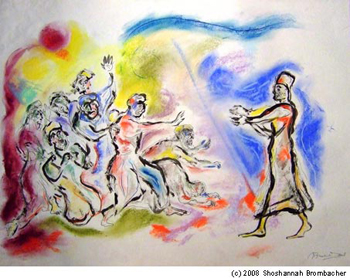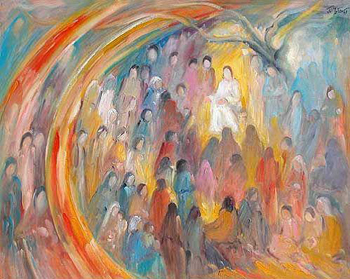For Sunday February 24, 2019
Lectionary Readings (Revised Common Lectionary, Year C)
Genesis 45:3-11, 15
Psalm 37: 1-11, 39-40
1 Corinthians 15:35-38, 42-50
Luke 6:27-38
When I looked up the lectionary readings for this week, the first thing I did was flinch, and the second thing I did was tell God he has an obnoxious sense of humor. I did these things because the readings are about forgiveness, and I'm afraid to write about forgiveness while I struggle to practice it in my own life.
In our Old Testament reading, Joseph — after suffering abandonment, false accusation, and years of imprisonment — forgives his brothers for sending him into a lifetime of hardship: “Do not be distressed, or angry with yourselves because you sold me here; for God sent me before you to preserve life.” The Psalmist, meanwhile, enhorts his readers to “refrain from anger, and forsake wrath,” because “fretting” over evil only leads to more evil. In his epistle to the Corinthians, Paul writes about seeds that must die before new life can grow, and reminds his readers that we cannot know ahead of time what God will do with the “bare” and perishable seeds we sow into the ground. All we can do is consent to “die” to everything that hinders new life, and trust that God will raise our dishonor and weakness into glory and power.
And finally, in the Gospel of Luke, Jesus continues his “Sermon on the Plain” with teachings so stark, countercultural, and difficult, we hardly know what to do with them even now, two thousand years after he spoke them: “Love your enemies, do good to those who hate you, bless those who curse you, pray for those who abuse you. If anyone strikes you on the cheek, offer the other also; and from anyone who takes away your coat do not withhold even your shirt.” And again: “Be merciful, just as your Father is merciful. Do not judge, and you will not be judged; do not condemn, and you will not be condemned. Forgive, and you will be forgiven.”
 |
So. What can I say about forgiveness? I, who am still struggling to forgive deep hurts from my past — hurts inflicted by a misogynistic church, a fear-and-violence based upbringing, the honor-and-shame culture that shaped my early adulthood, and years of sexual abuse? What can we say about forgiveness? We, living in the era of Trump, #MeToo, mass shootings, child detention centers, ongoing racial violence, and the sexual abuse scandals even now rocking the Catholic Church and the Southern Baptist Convention?
Perhaps we must begin by saying what forgiveness is not. Forgiveness is not denial. Forgiveness isn’t pretending that an offense doesn't matter, or that a wound doesn't hurt. Forgiveness isn't acting as if things don't have to change, or allowing ourselves to be abused and mistreated because “God wants us to forgive and forget," or assuming that God isn't interested in justice. Forgiveness isn't the same thing as healing or reconciliation. Healing has its own timetable, and sometimes reconciliation isn't possible. Sometimes our lives depend on us severing ties with our offenders, even if we've forgiven them.
Secondly, forgiveness isn’t a detour or a shortcut. Yes, Christianity insists on forgiveness. But it calls us first to mourn, to lament, to burn with zeal, and to hunger and thirst for justice. Forgiveness in the Christian tradition isn't a palliative; it works hand-in-hand with the arduous work of repentance and transformation. In other words, there is nothing godly about responding to systemic evil with passive acceptance or unexamined complicity. As theologian and anti-Nazi dissident Dietrich Bonhoeffer warns us, we must never allow forgiveness to degenerate into "cheap grace." That is, "the preaching of forgiveness without requiring repentance, baptism without church discipline, Communion without confession… grace without the Cross."
Thirdly, forgiveness is not instantaneous. Not for us humans. Not if we’re honest. Forgiveness is a process — a messy, non-linear, and often barbed process that can leave us feeling healed up and free one minute, and bleeding out of every pore the next. In my experience, no one who says the words "I forgive you" gets a pass from this messy process, and no one who struggles extra hard to forgive for reasons of temperament, circumstance, or trauma should feel that they're less godly or spiritual than those who don't. Consider that before Joseph forgave his brothers, he wrestled with a strong desire to scare and shame them. In fact, he did scare and shame them. Forgiveness was something Joseph had to arrive at, slowly and painfully. There was no cathartic, "altar call" moment when the hurts of his past slipped off his back and rolled away. There was only life, lived one layered, complicated, and unsentimental moment at a time.
 |
Why? Because he — like all of us — was created for goodness. For a just and nurturing world. For a family that would keep him safe. And just as Joseph did, when we experience the good world being ripped away from us, it is appropriate — it is human and healthy — to react with horror. One of the great gifts of Christianity (at its best) is that it takes sin and sin’s consequences dead seriously. Sin wounds. Sin breaks. Sin echoes down the ages. And so forgiveness isn't an escalator; it's a spiral staircase. We circle, circle, and circle again, trying to create distance between the pain we’ve suffered and the new life we seek. Sometimes we can’t tell if we’ve ascended at all; we keep seeing the same, broken landscape below us. But slowly, slowly, slowly, our perspective changes. Slowly, slowly, slowly, the ground of our pain falls away. Slowly, slowly, slowly, we rise.
If forgiveness isn’t denial or a detour, if forgiveness isn’t quick — then what is it? What is Jesus asking of us when he asks us to love, bless, pray, give, lend, do good, withhold judgment, extend mercy, and turn the other cheek?
In her popular memoir, Traveling Mercies, Anne Lamott writes that witholding forgiveness is like drinking rat poison and then waiting for the rat to die. Nora Gallagher writes, "Forgiveness is a way to unburden oneself from the constant pressure of rewriting the past." Henri Nouwen writes, "Forgiveness is the name of love practiced among people who love poorly. The hard truth is that all people love poorly, and so we need to forgive and be forgiven every day, every hour increasingly. Forgiveness is the great work of love among the fellowship of the weak that is the human family."
 |
If these writers are correct, then I think forgiveness is choosing to foreground love instead of resentment. If I'm consumed with my own pain, if I've made injury my identity, if I insist on weaponizing my well-deserved anger in every interaction I have with people who hurt me, then I'm drinking poison, and the poison will kill me long before it does anything to my abusers. To choose forgiveness is to release myself from the tyranny of bitterness. To give up my frenzied longing to be understood and vindicated by anyone other than God. To cast my hunger for justice deep into Christ’s heart, because justice belongs to him, and he's the only one powerful enough to secure it.
I wonder if we're often squeamish about forgiveness because we misunderstand the nature of unconditional love. Foregrounding God's all-embracing love doesn't for one second require us to relativize evil. If it did, God's love would be cruel and weak, not compassionate and strong. But where we humans make love and judgment mutually exclusive — where we cry out for revenge, retribution, and punishment — God holds out for restorative justice. A kind of justice we can barely imagine. A kind of justice that has the power to heal both the oppressed and the oppressor.
Secondly, I think forgiveness is a transformed way of seeing. When Joseph forgives his brothers, he reframes the horrible events of his life to include the redemptive artistry of God: “God sent me before you to preserve life.” To be clear: this doesn’t mean that God willed Joseph’s brothers to abuse and abandon him. I don’t believe that abuse is ever God’s will or plan for any of his children. Rather, what Joseph is saying is that God is always and everywhere in the business of taking the worst things that happen to us, and going to work on them for the purposes of multiplying wholeness and blessing. Because God is in the story, we can rest assured that it will not end in loss and trauma. There will be another turn, another chapter, another path, another grace. As Jesus promises his listeners, the measure we give will be given back to us: "A good measure, pressed down, shaken together, and running over.” Because God loves us, we don’t have to forgive out of scarcity. We can forgive out of God’s amazing abundance.
As I was doing research for this essay, I reached out to my priest, and she sent me a beautiful sermon excerpt on forgiveness from Lutheran minister Nadia Bolz Weber. Bolz-Weber, after describing mistreatment as a chain that binds us, writes stunningly about the power of forgiveness. I want to share her words in conclusion, because they speak so powerfully to me:
“Maybe retaliation or holding onto anger about the harm done to me doesn’t actually combat evil. Maybe it feeds it. Because in the end, if we’re not careful, we can actually absorb the worst of our enemy, and at some level, start to become them. So what if forgiveness, rather than being a pansy way to say, ‘It’s okay,’ is actually a way of wielding bolt-cutters, and snapping the chains that link us? What if it’s saying, ‘What you did was so not okay, I refuse to be connected to it anymore.’? Forgiveness is about being a freedom fighter. And free people are dangerous people. Free people aren’t controlled by the past. Free people laugh more than others. Free people see beauty where others do not. Free people are not easily offended. Free people are unafraid to speak truth to stupid. Free people are not chained to resentments. And that’s worth fighting for.”
As I let these words wash over me again and again, I pray — first for myself, and then for all of us — that we will take up the hard work of forgiveness for the sake of both wholeness and justice. I believe it is the most important work we can do for the life of the world. May we loosen the chains that bind us. May we rise. And may we — in God's time — taste the full measure of the freedom he offers us.
Image credits: (1) 567ministries.com; (2) Chabad.org; and (3) Pilgrim-info.com.



